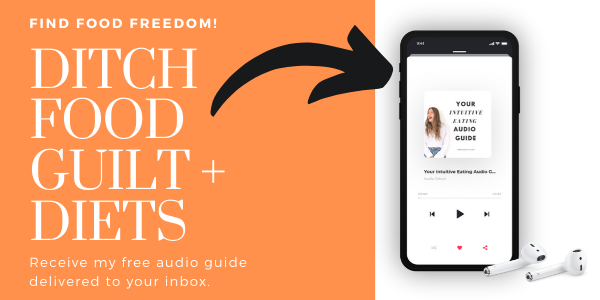Introduction
It’s so common to feel like you're doing everything wrong when it comes to health-promoting behaviours. You know what's 'good' for you and yet you can't make it stick. Maybe your motivation isn't there? Or it's all too much?
This episode explores:
- 6 reasons why pursuing health promoting behaviours may feel hard
- Where to from here
Resources mentioned:
- The Food and Body Freedom Facebook community
- Transcript of this episode below
I'm Nadia Felsch, anti diet nutritionist and certified Intuitive Eating counsellor. In this podcast we explore the practical aspects of leaving the diet mentality behind and finding your own food and body freedom. Today I am thrilled to be diving into something that I see time and time again, as kind of a start of folks feeling better in and about their bodies. So we're going to be diving into six reasons why pursuing health promoting behaviours may feel hard. It is incredibly common. It's so uncommon for folks to tell me how it feels like they are doing everything wrong. I know I should eat more veggies but I don't. I should exercise but I never ended up doing it. I know that meditation is good for me. But it's also something that I don't have time for. It's another thing I don't have time for. And whilst all of this is really normal, it's just not the full story. It's quite black and white. So let's dive in to these six reasons and hey, maybe you want to take some notes. Maybe you want to write down some insights that you have about your own experience as you're listening along. And that you could explore and kind of process later on. So reason number one why pursuing health promoting behaviours may feel hard is that let's kind of talk about exercise. So exercise or movement might have been used as a weapon essentially against you. Maybe exercise or movement. has actually only ever been about weight loss, about your body needing to be fixed about changing your body. And I have seen this countless times over and over again where way back to someone's childhood movement has never been fun or playful or beneficial. And in fact, they really only learned about it from a perspective of manipulation of their their size and their body. Or there might be one added layer where Oh, okay, I know it's good for me and maybe sometimes I noticed that but that's that's kind of lost in the weeds because really, there is a possibly very painful experience of when movement has felt like non welcoming, maybe actual places that that you've gone to have been non inclusive, you know, violent in some capacities against you existing there or fitting in there. And for so many human beings movement has been a weapon against you. So that is reason number one why, therefore going and launching into movement is not going to be this exciting, exhilarating, playful experience because there's a whole heap of really hard stuff that sits there. So reason number two is you have felt shame in your body. Maybe you have been made to feel unworthy in your body, your body should be a different one, a different ability, a different look a different colour a different size. And you've internalised that messaging you believe that and so why, why this is so painful and also so important is that at the core, it doesn't feel like your body is one worth looking after or respecting. You know, you might say things like once I get to this weight, once I can fit into X clothing, then then I can look after myself and in the meantime, I'm going to do everything I can to get to that which possibly and very likely doesn't look anything like pursuing health and is possibly incredibly traumatising in and of itself. So if you have been made to feel like your body is not good enough, the idea of looking after it just to look after it is possibly a very hard to process concept. And that is something that I see and hear about a lot. And I also see and hear it change
So reason number three is really about your dietary pattern or specific foods. So you might feel as very very many people do that say fruit and vegetables feel like being on a diet they feel like you know maybe for you those foods or eating those foods has always been associated or mostly associated with restriction with being you know, on the waggon dieting, weight loss attempts, Weight Watchers, calorie counting, My Fitness Pal, etc, etc, etc. They have they have filled a place that feels shitty. And I want to be clear, none of those concepts restriction, weight loss, dieting, they don't own fruit and vegetables. They don't own foods that we commonly associate with being really nutritious. That in and of itself is a little bit of a rabbit hole of problematic thinking. But for now let's just keep it surface level that when you think of eating broccoli, you might think of that as why would I eat that if I could just eat chips there were yummy. And if that's your instinct, and by the way, I don't love broccoli so I'm actually gonna say chips are yummy. Ah, that's probably a terrible example. But okay, let me give you another example. I have a client who just this week shared with me that she felt like eating an orange because an orange felt like play food. And that was really a whole new experience because in the past, she would have only thought that plant foods were things like chips and chocolate and ice cream. The ones that we say apparently are not nutritious, and now that's not true. But that's what diet culture tells us. We can't eat those on the diet. We can't eat those when we're trying to lose weight. We can only eat the oranges and bananas and now now that feels different for her. But if you're in a place where that is feeling inherently like you are trying to diet Therefore when you go to eat those foods or you plan to eat those foods, that's why it can feel hard. So reason number four, wherever halfway here is you don't feel connected to your body. You don't feel connected to the sensations that your body is experiencing the signals that it is sending you with those sensations, your own needs. And your preferences might actually feel really unfamiliar, but also untrustworthy. So let's kind of talk about a really common one that folks love to kind of have a bit of a giggle about me too. You know what it feels like in your body to need to pee right you know it, you absolutely know it and you trust it. And you don't doubt it. So say you're going on a road trip. And I'm the person by the way that needs to weigh every five seconds just is and that's just what it is. I know what that feels like and if I'm in the car with some friends or family, maybe that they I roll because they don't want to stop. But I can guarantee you that nobody well, I shouldn't guarantee that, but possibly very few people would question me. But I wonder what that feels like if you say you're hungry. Do you trust it? Do you trust what it is to feel satisfied from certain foods? And the differences that that feels like? What about when you aren't kind of feeling your best? You might have low mood, you might have low energy. Do you know the things that your body is trying to communicate to you? So not only might that feel really kind of discombobulated and a bit vague for you to identify what all of those things are. It also feels very untrustworthy. You might find it really easy to say, Oh no, I'm not hungry. I'm thirsty or No, I'm not hungry. It's not it's not lunchtime. So it's not feeling connected. Why? Therefore pursuing honouring your body is going to feel really hard. So reason number five is that whatever health promoting behaviour you're looking at, isn't centred on you. You know it's green smoothie, Instagram nonsense. It's running a 10k that you hate running. It's going to meditation and you're really mistrusting of it or not interested in it but you know, so and so says it's great for you. By the way, it is great. None of these things are problematic. I want to be clear green smoothies. I got no beef with 10k rounds. I got no beef with meditation I love but they have to be centred on you. And what we absolutely like are conditioned to believe because of diet culture, is that you also need to be doing all those things at the same time in one day to be healthy. So not only are they not centred on you, and you didn't choose them, and they're probably not even possibly that interesting to you. Now there's this entire pressure to be a certain way and this is actually like the cult
aspect of diet culture. So that's why it's therefore going to be hard to maintain. Cuz you probably not even that interested in it, but you think you're meant to be because so and so at work is Susan Karen, Karen's into the green smoothie, so you got to be no nonsense. And reason number six the final reason why pursuing health promoting behaviours could feel hard for you is that your nervous system is dysregulated. You are chronically stressed, you are in survival mode, you are spent. So you know you are thinking hey, if I go for a walk every day, I know that's going to be good for me and actually maybe I even know it feels quite good for me. But you don't have the capacity for that. Because there is so much going on in your immediate existence in your body, that you don't have the resources and capacity to commit to that to make that happen because that actually is just too much. And all of these reasons are why healthy behaviours and pursuing health promoting behaviours can feel hard. I'm gonna actually say maybe they can actually feel quite paralysing to even begin with where do I start? It's like something that you say I'll do that one day. I'll get it together one day, and that day never comes. And in the meantime, what's worse is actually that you are beating yourself up so much. So what you need is self compassion. You need to give yourself love and I'm going to be really, really transparent that that that possibly right now is the that could feel like the hardest, hardest thing to access because, again, the internalised messaging that you have is something more like well, you didn't get it together. You're a piece of dirt except a that is not even remotely true and be How is that helpful? Like truly efficiently? valuably speaking. crapping on yourself is never helpful. It never gets you where you want to go. We need to try something else. So from a practical perspective, what would you say? To someone that you love? Who feels like you do right now? Can you offer that to yourself? Because you do deserve that? You absolutely deserve that. And if you do want to pursue health promoting behaviours, which is most interesting to you, which is most exciting to you, which feels attainable, and what support would help you to get there. So if you found this exploration helpful, please feel free to go ahead and send me a message over on Instagram because I hang out there a lot. And tell me one thing inside of this podcast that helped you, I would love to hear. The next episode is actually going to be quite connected to this one. haven't really done that before. It's going to be diving into this obstacle. This kind of concept of why this could be hard for you from another intersecting lens that's addressing a very big impact, and also something that's really not understood by most folks. And why essentially, therefore, radical self care is at the core of food and body freedom. So really, I'm going to be expanding on that final reason. Reason number six of your nervous system being dysregulated and where that all fits in here. For all of the links and notes from this episode, head to my website, which is Nadia felsch.com forward slash podcast, or you'll find the link in the podcast player that you're currently listening on. Thank you. So much for joining me. I'll see you next time.
Transcribed by https://otter.ai


